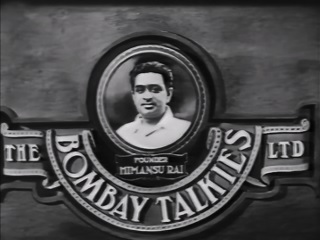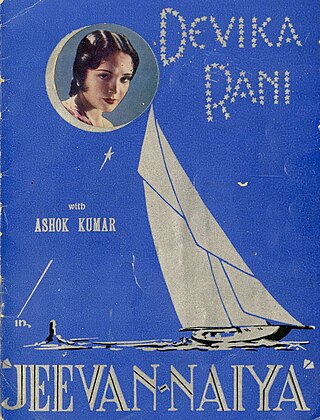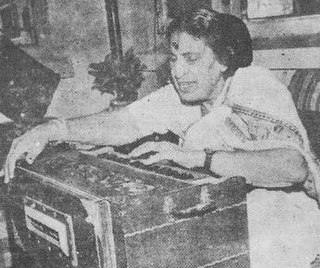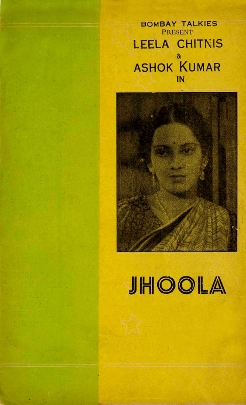
Devika Rani Chaudhuri, usually known as Devika Rani, was an Indian actress who worked in Hindi films. She was the first recipient of the Dadasaheb Phalke Award and was awarded the Padma Shri. Widely acknowledged as the First Lady of Indian cinema, Devika Rani is regarded as one of the greatest actresses. One of the highest-paid actress of the 1930s early 1940s, she appeared in Box Office India's "Top Actresses" list in 1940 and 1941.

Bombay Talkies was a movie studio founded in 1934. During its period of operation, Bombay Talkies produced 40 movies in Malad, a suburb of the Indian city of Bombay.

Himanshu Rai was an Indian actor and film director. Regarded as one of the pioneers of Indian cinema, he is best known as the founder of the studio in 1934, along with Devika Rani. He was associated with a number of movies, including Goddess (1922), The Light of Asia (1925), Shiraz (1928), A Throw of Dice (1929) and Karma (1933). He was married to actress Devika Rani Chaudhuri (1929–1940).

Kismet (transl. Fate) is a 1943 Indian drama film, directed by Gyan Mukherjee, written by Mukherjee with Aghajani Kashmeri. It stars Ashok Kumar, Mumtaz Shanti, and Shah Nawaz. The film came with some bold themes for the first time in the history of Indian cinema, showing an anti-hero character with two roles and an unmarried girl getting pregnant.

Achhut Kannya is a 1936 Indian Hindi film. The film deals with the social position of Dalit girls and is considered a reformist period-piece.

Jeevan Naiya is a 1936 Indian Hindi film directed by Franz Osten, and produced by Himanshu Rai for his studio Bombay Talkies. It is famous for being the screen debut of early superstar Ashok Kumar. The film is about the ostracism of dancing girls. The film was one of several successful Bombay Talkies collaborations between Franz Osten, Himashu Rai, screenwriters J. S. Kashyap and Niranjan Pal, and their leading lady of the time, Devika Rani.

Basant (transl. Spring) is a 1942 pre-partition Indian romantic musical film directed by Amiya Chakrabarty, produced by Bombay Talkies and starring Mumtaz Shanti and Madhubala along with Ulhas. It revolves around Uma (Shanti), who is left to dance on stage for money when her husband (Ulhas) abandons her.

Saraswati Devi, born Khorshed Minocher-Homji, was an Indian director of music and score composer who worked in Hindi cinema in the 1930s and 1940s. She is most noted for her score, Mein Ban ki Chiriyra Banke Bun Bun Bolun Re in Bombay Talkies's Achut Kanya (1936). She along with Nargis' mother & Sanjay Dutt's grandmother Jaddanbai is considered to be one of the first female music composers in Indian cinema.

Jhoola (transl. Swing) is a 1941 Indian Hindi-language film directed by Gyan Mukherjee. It was produced by Sashadhar Mukherjee under the banner of Bombay Talkies. The film starred Leela Chitnis, Ashok Kumar, Shah Nawaz, V.H.Desai, Mumtaz Ali, Karuna Devi, Shahzadi, Rajkumari Shukla, Minoo Cooper, M.A.Aziz, and Master Laxman. The music was composed by Saraswati Devi with lyrics by Kavi Pradeep. The film was remade in Telugu as Uyyala Jampala (1965).
Punar Milan is a 1940 Bollywood film directed by Najam Naqvi and written by Saradindu Bandopadhyay. Kishore Sahu and Snehaprabha Pradhan played the lead roles in the movie.

Anjaan is a 1940 Indian Hindi-language film directed by Amiya Chakrabarty and produced by Bombay Talkies. It was Chakrabarty's first film direction. The film's story and screenplay were by Amiya Chakrabarty, with dialogues by J. S. Casshyap. The cinematography was by the debutant R. D. Mathur. Its music direction was by Pannalal Ghosh, with lyrics by Kavi Pradeep and P. L. Santoshi. The film starred Devika Rani, who had recently returned to films after a two-year absence, following the death of her husband Himanshu Rai in 1940. The cast included Ashok Kumar, David, V. H. Desai, Gulab, Suresh and Om Prakash.

Mumtaz Ali was an Indian dancer and character actor in Hindi cinema from the 1940s to 1970s. He was the father of Indian actor Mehmood. He also had his own dance troupe "Mumtaz Ali Nites" which performed all over India. His career slumped due to his excessive drinking and his family fell into hard times, leading to his son Mehmood to work as a child artist and daughter Minoo Mumtaz to work as dancer in his stage shows and later in movies.

Prem Kahani is a 1937 Indian Hindi film, by Franz Osten and starring Ashok Kumar, N.M. Joshi, Mayadevi, Vimala Devi, Madhurika Devi and others.
Grama Kanya is a 1936 Hindi melodrama film directed by Sarvottam Badami. The film produced by Sagar Movietone had cinematography by Faredoon Irani, story by Jayant Shyam and dialogue by Waqif. The music was composed by the renowned bhajan singer Shankarrao Khatu. The cast included Surendra, Sabita Devi, Yakub, Aruna, Kayam Ali, and Gulzar.

Jeevan Prabhat is a 1937 Hindi film social drama, produced by Bombay Talkies and directed by Franz Osten. The music director was Saraswati Devi with lyrics and dialogues by J. S. Casshyap. The screenplay was by Niranjan Pal. The film's "star value" was Devika Rani, with Kishore Sahu making his debut as an actor in the film. The cast included another debutant, Renuka Devi, with Mumtaz Ali, Maya Devi and M. Nazir.
![<i>Izzat</i> (1937 film) 1937 [[British India]] film](https://upload.wikimedia.org/wikipedia/commons/thumb/9/9c/Izzat_%281937%29.jpg/320px-Izzat_%281937%29.jpg)
Izzat (transl. Honour) is a 1937 Hindi film social drama, directed by Franz Osten. The film was produced by Himanshu Rai for Bombay Talkies. The credit roll of Izzat attributes the story to Dr. G. Nundy, adapted for screen by J. Nundy. The screenplay was by Niranjan Pal, who handled the story section of Bombay Talkies. J. S. Casshyap wrote the songs and dialogues and was assisted in dialogue direction by S. I. Hassan. The music was composed by Saraswati Devi, with actor Mumtaz Ali doubling as the choreographer. The film starred Ashok Kumar with Devika Rani in the lead, while the rest of the cast included Mumtaz Ali, Madhurika, Kamtaprasad, Chandraprabha, and P. F. Pithawala.

Savitri is a 1937 Indian Hindi-language mythological film directed by Franz Osten. Adapted from a story in the Mahabharata by Niranjan Pal with dialogues by J. S. Casshyap. The cinematographer was Joseph Wirsching. Saraswati Devi composed the music. According to Garga, Savitri was the "only mythological" produced by Himanshu Rai for Bombay Talkies, who were known for making "rurlist reform dramas". Ashok Kumar and Devika Rani played the lead roles supported by Maya Devi, Saroj Borkar, Mumtaz Ali, and Sunita Devi.
![<i>Vachan</i> (1938 film) 1938 [[British India]] film](https://upload.wikimedia.org/wikipedia/commons/thumb/6/62/Vachan_1938_films.jpg/320px-Vachan_1938_films.jpg)
Vachan is a 1938 costume drama Hindi film directed by Franz Osten. The regular Bombay Talkies writer, Niranjan Pal, walked out of the Bombay Talkies production team after an altercation with Himanshu Rai in 1936. Saradindu Bandyopadhyay, a famous writer known also for creating Byomkesh Bakshi, replaced Pal in the story department, writing for films like Nirmala and Vachan in 1938 and Durga in 1939. The screenplay was by Agha Jani Kashmiri, with dialogues and lyrics by J. S. Kashyap. The music was composed by Saraswati Devi aided by J. S. Kashyap. The film starred Devika Rani and Ashok Kumar, a popular pair from Bombay Talkies who worked in seven films together. Devika Rani remained the bigger star with Kumar's name being "over-shadowed" in the credit rolls, as well as the publicity of the film.

Nirmala is a 1938 Indian Hindi-language social drama film directed by Franz Osten and produced by Bombay Talkies.

Daadi Maa (transl. Grandmother) is a 1966 Indian Hindi-language drama film directed by L. V. Prasad and starring Ashok Kumar, Bina Rai, Mumtaz, Tanuja and Durga Khote.














![<i>Izzat</i> (1937 film) 1937 [[British India]] film](https://upload.wikimedia.org/wikipedia/commons/thumb/9/9c/Izzat_%281937%29.jpg/320px-Izzat_%281937%29.jpg)

![<i>Vachan</i> (1938 film) 1938 [[British India]] film](https://upload.wikimedia.org/wikipedia/commons/thumb/6/62/Vachan_1938_films.jpg/320px-Vachan_1938_films.jpg)

